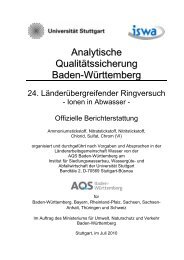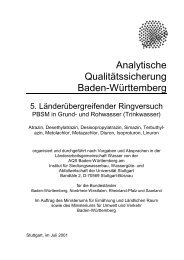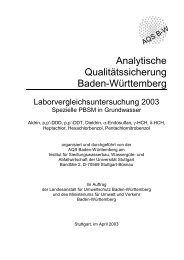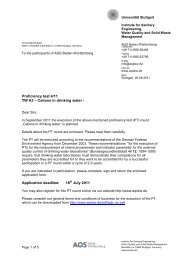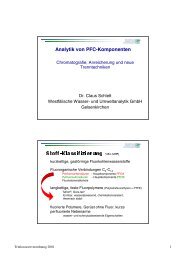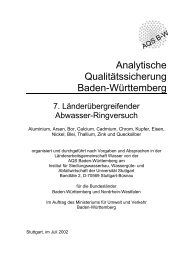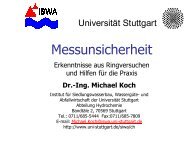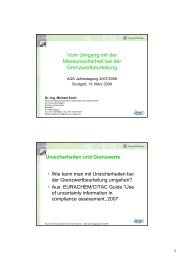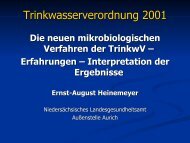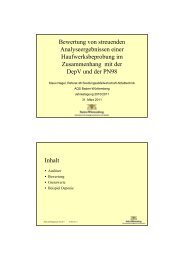Institute for Sanitary Engineering, Water Quality and Solid Waste ...
Institute for Sanitary Engineering, Water Quality and Solid Waste ...
Institute for Sanitary Engineering, Water Quality and Solid Waste ...
Create successful ePaper yourself
Turn your PDF publications into a flip-book with our unique Google optimized e-Paper software.
Chair of <strong>Waste</strong> Management <strong>and</strong> Emissions<br />
Development of new technologies <strong>for</strong> production<br />
<strong>and</strong> application of plastics from renewable resources.<br />
The annual output of petrochemical plastics of the global<br />
production from crude oil is more than 300 million<br />
tonnes. Plastics are used in numerous applications <strong>for</strong><br />
our daily life. But after their useful life as plastics materials<br />
they will be disposed in l<strong>and</strong>fills, dumpsites, or<br />
delivered to composting plants or to incinerators. The<br />
degradability in general is very slow, in the case of<br />
l<strong>and</strong>fills we are expecting to last hundreds of years. In<br />
incinerators they are used <strong>for</strong> producing energy, but<br />
with this oxidising process plastics from crude oils are<br />
contributing to increasing amounts of the greenhouse<br />
gas carbon dioxide (CO 2<br />
).<br />
Degradability of plastics is known as a non biotic process<br />
with the influence of UV, light <strong>and</strong> oxygen. A second<br />
way <strong>for</strong> degradation is the biological influence<br />
of micro organisms. Also some of the petrochemical<br />
plastics can be biologically degraded, e.g. polyesters.<br />
But also in this case we will have increasing amounts<br />
of the greenhouse gas CO 2<br />
.<br />
Degradability of lignin based bioplastic - Respirometric<br />
Test<br />
There<strong>for</strong>e during the last years new plastics were developed,<br />
plastics from renewable resources <strong>and</strong> biologically<br />
degradable by micro organisms.<br />
Our own project research was done with a very new<br />
degradable plastic from lignin, a by-product in the cellulose<br />
pulping process <strong>for</strong> papermaking .The degradability<br />
of this new product based on lignin was tested<br />
in aerobic conditions with respirometric tests <strong>and</strong> also<br />
in a composting process. The velocity of the degradation<br />
process is depending on the composition of the<br />
plastics. In the respirometric tests we found <strong>for</strong> the<br />
different products a degradation rate of about 30% up<br />
to 80 % in a time of 80 days, using longer testing time,<br />
the degradation rate was increasing up to 50 % up to<br />
100 % in 120 days.<br />
Plastics have an important impact on the environment.<br />
Bioplastics can be produced from renewable raw material<br />
<strong>and</strong> are partially biologically degradable. Currently<br />
the production of bioplastics is relatively low. In the<br />
case of bigger amounts this material should be integrated<br />
in the waste management. The new bioplastics<br />
based on lignin that we have analyzed could be considered<br />
as well degradable in the respirometric tests.<br />
The usability <strong>for</strong> many applications seems to be really<br />
good. As it is a material from renewable resources, the<br />
degradation process will not give any influence to the<br />
greenhouse effect.<br />
Degradability of lignin based bioplastic - Respirometric<br />
Test<br />
Sponsorship:<br />
AIF<br />
Projekt partner:<br />
• Fa. Tecnaro GmbH<br />
• Fa. Bauer Kunststofftechnik<br />
• Institut für Siedlungswasserbau, Wassergüteund<br />
Abfallwirtschaft; Lehrstuhl für Abfallwirtschaft<br />
und Abluft (ISWA, AFW)<br />
Duration:<br />
April 2008 - March 2010<br />
Contact:<br />
Dr.-Ing. Klaus Fischer<br />
Dipl.-Ing. Jingjing Huang<br />
76



